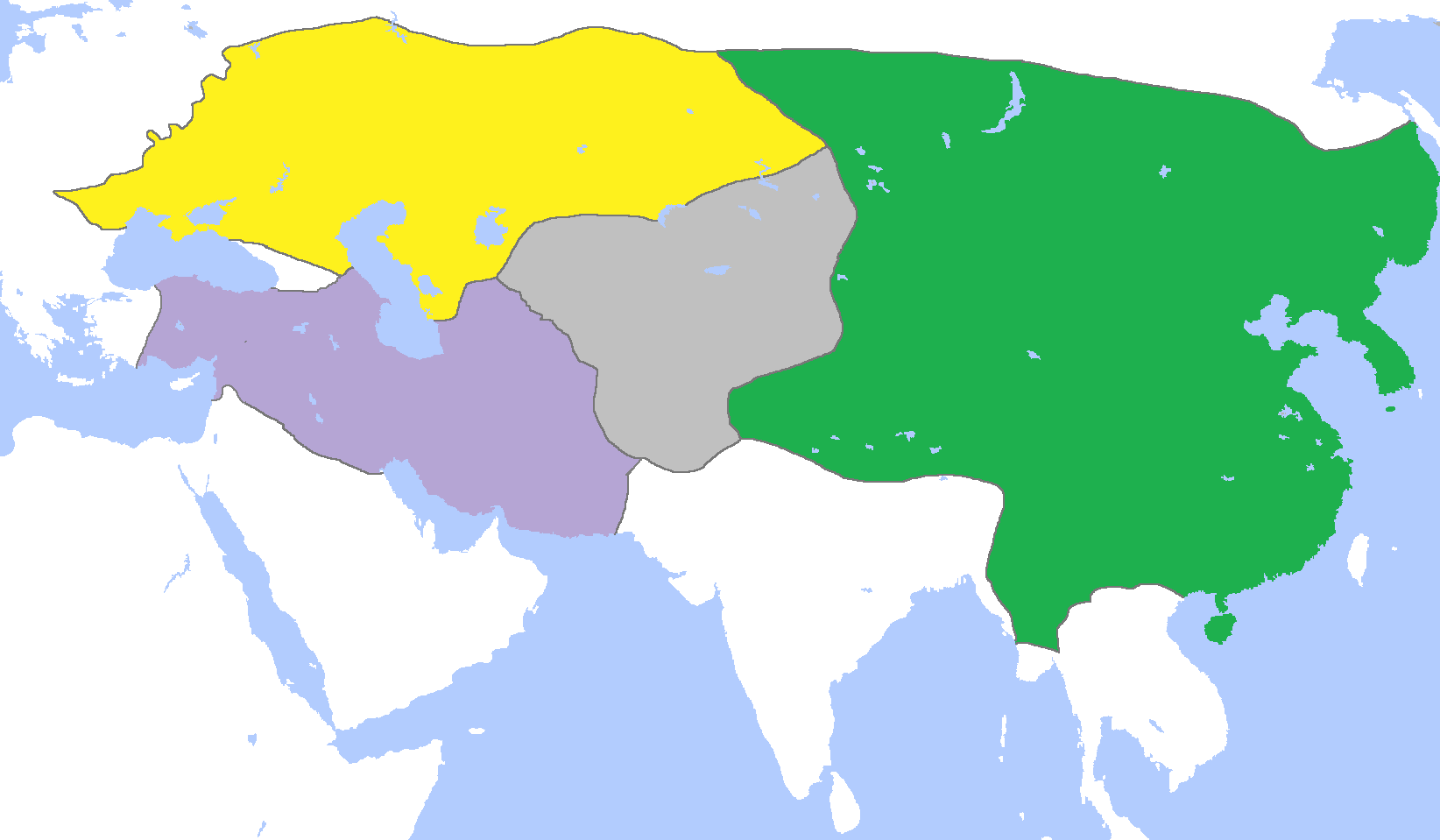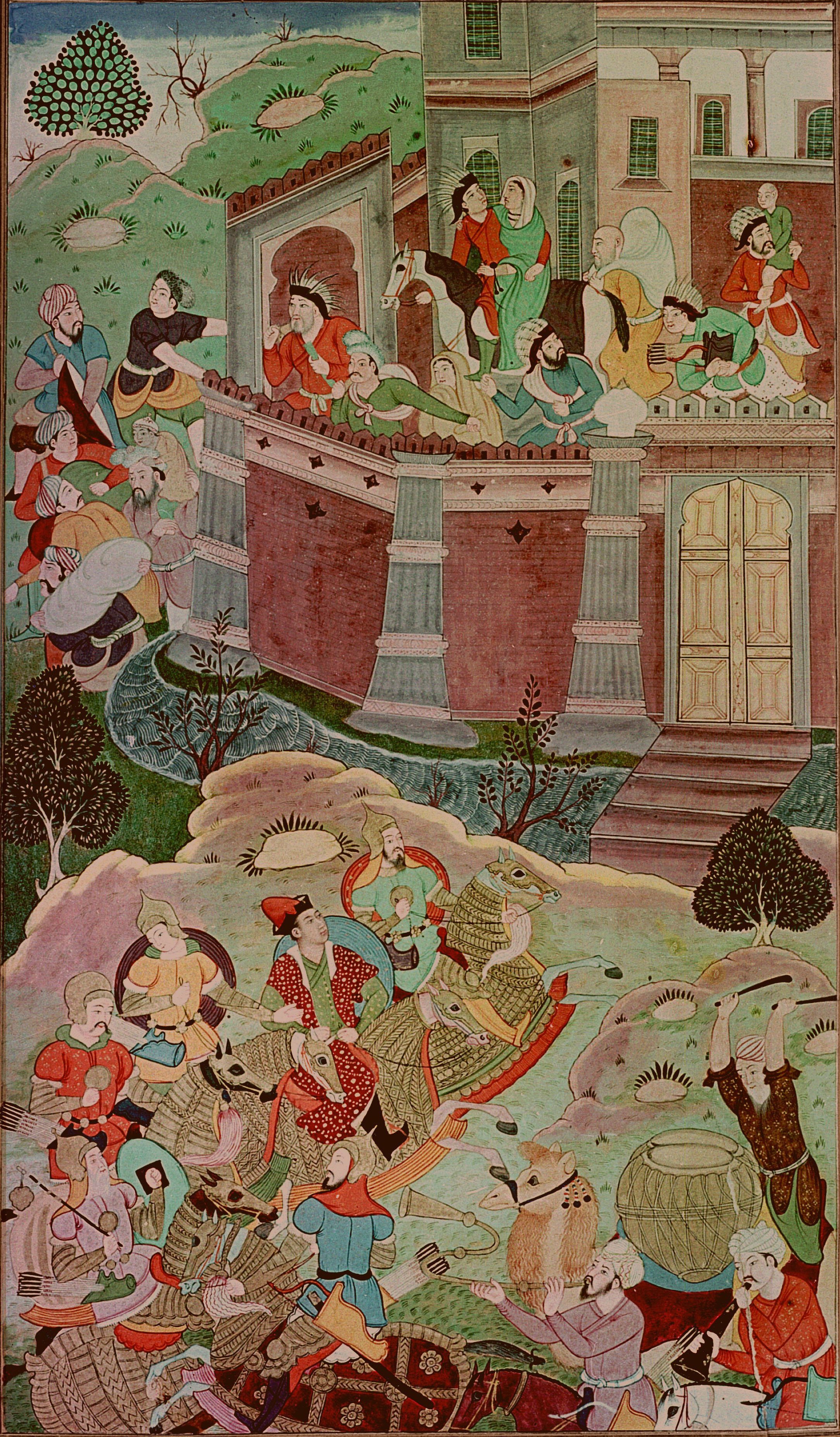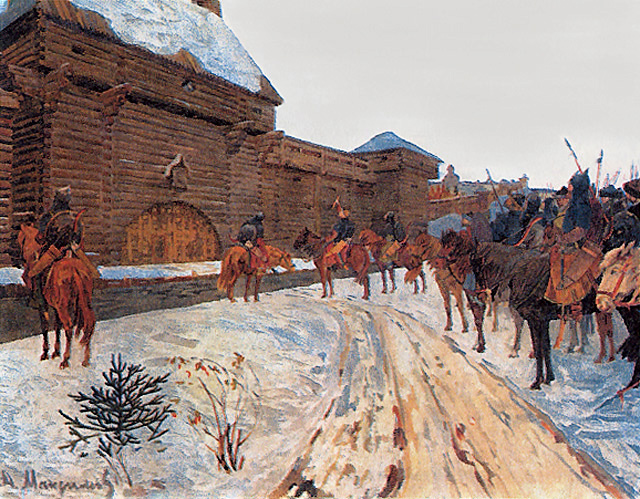|
List Of Mongol Khan
The following is a list of Mongol rulers. The list of states is chronological but follows the development of different dynasties. Khamag Mongol (1120s–1206) * Kaidu (11th century), Kaidu – the first Khan to unite the Mongol clans * Khabul Khan – the first Khan of the Khamag Mongol confederation * Ambaghai, Ambaghai Khan * Hotula Khan * Yesugei ''(de facto)'' * Genghis Khan Mongol Empire (1206–1368) Great Khans and Yuan dynasty Before Kublai Khan announced the dynastic name "Great Yuan" in 1271, Khagans (Great Khans) of the Mongol Empire (''Ikh Mongol Uls'') already started to use the Chinese title of Emperor of China, Emperor () practically in the Chinese language since Genghis Khan (as ). With the establishment of the Yuan dynasty in 1271, the Kublaids became Yuan emperors, who took on a dual identity of Khagan for the Mongols and Emperor of China, Huangdi for Han Chinese, ethnic Han. *Genghis Khan (1206–1227) *Tolui, Tolui Khan (as Regent) (1227–1229 ... [...More Info...] [...Related Items...] OR: [Wikipedia] [Google] [Baidu] |
Yuan Dynasty
The Yuan dynasty (), officially the Great Yuan (; xng, , , literally "Great Yuan State"), was a Mongol-led imperial dynasty of China and a successor state to the Mongol Empire after its division. It was established by Kublai, the fifth khagan-emperor of the Mongol Empire from the Borjigin clan, and lasted from 1271 to 1368. In orthodox Chinese historiography, the Yuan dynasty followed the Song dynasty and preceded the Ming dynasty. Although Genghis Khan had been enthroned with the Han-style title of Emperor in 1206 and the Mongol Empire had ruled territories including modern-day northern China for decades, it was not until 1271 that Kublai Khan officially proclaimed the dynasty in the traditional Han style, and the conquest was not complete until 1279 when the Southern Song dynasty was defeated in the Battle of Yamen. His realm was, by this point, isolated from the other Mongol-led khanates and controlled most of modern-day China and its surrounding areas, including ... [...More Info...] [...Related Items...] OR: [Wikipedia] [Google] [Baidu] |
Gegeen Khan
Gegeen Khan ( Mongolian: ذ“رچذ³رچرچذ½ ر…ذ°ذ°ذ½; Mongol script: ; ''Shidebal Gegegen qaخ³an''; ; born Shidibala (; 碩ه¾·ه…«ه‰Œ), also known by the temple name Yingzong (Emperor Yingzong of Yuan, Chinese: ه…ƒè‹±ه®—, February 22, 1302 – September 4, 1323), was an emperor of the Yuan dynasty of China. Apart from Emperor of China, he is regarded as the ninth Great Khan of the Mongol Empire, although it was only nominal due to the division of the empire. His born name “Shidi-bala†() in Sanskrit means "purity protection" and regnal name means "enlightened/bright khan" in the Mongolian language. Early in his short reign, the Khunggirat faction played a key role in the Yuan court. When his grandmother Dagi (Targi) and the grand councillor Temuder died in 1322, his opponents seemed to have triumphed. Despite the Emperor's aim to reform the government based on the Confucian principles, Temuder's faction linked up with the Alan guard and assassinated the emperor in 1323. This was the ... [...More Info...] [...Related Items...] OR: [Wikipedia] [Google] [Baidu] |
Ayurbarwada Buyantu Khan
Buyantu Khan (Mongolian Language, Mongolian: ذ‘رƒرڈذ½ر‚ ر…ذ°ذ°ذ½; Mongolian script: ; ), born Ayurbarwada (Mongolian: ذگرژرƒر€ذ±ذ°ر€ذ±ذ°ذ´ ; ), also known by the temple name Renzong (Emperor Renzong of Yuan (Standard Mandarin, Chinese: ه…ƒن»په®—, April 9, 1285 – March 1, 1320), was the fourth emperor of the Yuan dynasty of China. Apart from Emperor of China, he is regarded as the eighth Khagan, Great Khan of the Mongol Empire, although it was only nominal due to the division of the Mongol Empire, division of the empire. His name means "blessed/good Khan" in the Mongolian language. His name "Ayurbarwada" was from a Sanskrit compound "ؤ€yur-parvata" (), which means "the mountain of longevity", in contrast with Emperor Wuzong's name Qaiإ،an (وµ·ه±±, "mountains and seas" in Chinese). Ayurbarwada was the first Yuan emperor who actively supported the adoption of Confucian principles into the administration system. The emperor, who was mentored by the Confucian academic Li Meng (academi ... [...More Info...] [...Related Items...] OR: [Wikipedia] [Google] [Baidu] |
Kأ¼lأ¼g Khan
Kأ¼lأ¼g Khan ( Mongolian: ذ¥ز¯ذ»رچذ³; Mongolian script: ; ), born Khayishan (Mongolian: ذ¥ذ°ذ¹رپذ°ذ½ ; , mn, ذ¥ذ°ذ¹رپذ°ذ½, meaning "wall"), also known by the temple name Wuzong (Emperor Wuzong of Yuan; ) (August 4, 1281 – January 27, 1311), Prince of Huaining (و‡·ه¯§çژ‹) in 1304-1307, was an emperor of the Yuan dynasty of China. Apart from Emperor of China, he is regarded as the seventh Great Khan of the Mongol Empire, although it was only nominal due to the division of the empire. His name means "warrior Khan" or "fine horse Khan" in the Mongolian language. Early life He was the first son of Darmabala and Dagi of the influential Khunggirad clan, and the full brother of Ayurbarwada. He was sent to Mongolia to assume an army that defended the western front of the Yuan against Kaidu, ''de facto'' ruler of the Chagatai Khanate, and other princes in Central Asia under him. In 1289, Khayishan's force was nearly routed and the Kipchak commander, Tutugh, rescued him from cap ... [...More Info...] [...Related Items...] OR: [Wikipedia] [Google] [Baidu] |
Temأ¼r Khan
أ–ljeytأ¼ Khan ( Mongolian: س¨ذ»ذ·ذ¸ذ¹ر‚; Mongolian script: '; ), born Temأ¼r ( mn, ذ¢س©ذ¼س©ر€ ; ; October 15, 1265 – February 10, 1307), also known as Emperor Chengzong of Yuan () by his temple name ''Chengzong'', was the second emperor of the Yuan dynasty of China, ruling from May 10, 1294 to February 10, 1307. Apart from Emperor of China, he is considered as the sixth Great Khan of the Mongol Empire, although it was only nominal due to the division of the empire. He was an able ruler of the Yuan dynasty, and his reign established the patterns of power for the next few decades. His name means "blessed iron Khan" in the Mongolian language. Temأ¼r was a son of the Crown Prince Zhenjin and a grandson of the Yuan founder Kublai Khan. During his rule, the western khanates of the Mongol Empire accepted the supremacy of the Yuan dynasty. Family *Empress Shiliandali, (ه¤±و€œç”里çڑ‡هگژ) of the Hongjila clan (ه¼کهگ‰ه‰Œو°ڈ) from Onggirat, daughter of Oloؤچin Kأ¼regen **Prince Desh ... [...More Info...] [...Related Items...] OR: [Wikipedia] [Google] [Baidu] |
Ariq Bأ¶ke
Ariq Bأ¶ke (after 1219–1266), the components of his name also spelled Arigh, Arik and Bukha, Buka ( mn, ذگر€ذ¸ذ³ذ±س©ر…, Arigbأ¶h, ; ), was the seventh and youngest son of Tolui and a grandson of Genghis Khan. After the death of his brother the Great Khan Mأ¶ngke, Ariq Bأ¶ke claimed the title of the Great Khan of the Mongol Empire and briefly took power while his brothers Kublai and Hulagu were absent from the Mongolian Plateau. When Kublai returned for an election in 1260, rival factions could not agree, and elected both claimants, Kublai and Ariq Bأ¶ke, to the throne, resulting in the Toluid Civil War that fragmented the Mongol Empire. Ariq Bأ¶ke was supported by the traditionalists of the Mongol Empire, while his brother Kublai was supported by the senior princes of North China and Manchuria. Early years Ariq Bأ¶ke was the youngest son of Sorghaghtani Beki and Tolui, the youngest son of Genghis Khan. When Genghis died in 1227, the leadership of the Empire passed to Genghis' ... [...More Info...] [...Related Items...] OR: [Wikipedia] [Google] [Baidu] |
Mأ¶ngke Khan
Mأ¶ngke ( mn, ' / ذœس©ذ½ر… '; ; 11 January 1209 – 11 August 1259) was the fourth khagan-emperor of the Mongol Empire, ruling from 1 July 1251, to 11 August 1259. He was the first Khagan from the Toluid line, and made significant reforms to improve the administration of the Empire during his reign. Under Mأ¶ngke, the Mongols conquered Iraq and Syria as well as the kingdom of Dali (modern-day Yunnan). Appearance According to William of Rubruck, Mأ¶ngke Khan was a man of medium height. Early life Mأ¶ngke was born on 11 January 1209, as the eldest son of Genghis Khan's teenaged son Tolui and Sorghaghtani Beki. Teb Tengri Khokhcuu, a shaman, claimed to have seen in the stars a great future for the child and bestowed on him the name Mأ¶ngke, "eternal" in the Mongolian language. His uncle أ–gedei Khan's childless queen Angqui raised him at her orda (nomadic palace). أ–gedei instructed Persian scholar Idi-dan Muhammed to teach writing to Mأ¶ngke. On his way back home after th ... [...More Info...] [...Related Items...] OR: [Wikipedia] [Google] [Baidu] |
Gأ¼yأ¼k Khan
Gأ¼yأ¼k (also Gأ¼yug;; ''c''. March 19, 1206 – April 20, 1248) was the third Khagan-Emperor of the Mongol Empire, the eldest son of أ–gedei Khan and a grandson of Genghis Khan. He reigned from 1246 to 1248. Appearance According to Giovanni da Pian del Carpine, Gأ¼yأ¼k was of "medium stature, very prudent and extremely shrewd, and serious and sedate in his manners." Early life Gأ¼yأ¼k received military training and served as an officer under his grandfather Genghis Khan and later his father أ–gedei Khan (after the death of Genghis in 1227). He married Oghul Qaimish of the Merkit clan. In 1233, Gأ¼yأ¼k, along with his maternal cousin Alchidai and the Mongol general Tangghud, conquered the short-lived Dongxia Kingdom of Puxian Wannu, who was a rebellious Jin official, in a few months. After the death of Gأ¼yأ¼k's uncle Tolui, أ–gedei proposed that Sorghaghtani, the widow of Tolui, marry his son Gأ¼yأ¼k. Sorghaghtani declined, saying that her prime responsibility was to he ... [...More Info...] [...Related Items...] OR: [Wikipedia] [Google] [Baidu] |
Tأ¶regene Khatun
Tأ¶regene Khatun (also Turakina, , ) (d. 1246) was the Great Khatun and regent of the Mongol Empire from the death of her husband أ–gedei Khan in 1241 until the election of her eldest son Gأ¼yأ¼k Khan in 1246. Background Tأ¶regene was born into the Naiman tribe. Her first husband was a member of the Merkit clan. Some sources state that his name was Qudu (d. 1217), son of Toqto'a Beki of the Merkits.C.P. Atwood ''Encyclopedia of Mongolia and the Mongol Empire'', p. 544 However, Rashid-al-Din Hamadani named her first husband as Dayir Usun of the Merkits. When Genghis conquered the Merkits in 1204, he gave Tأ¶regene to أ–gedei as his second wife. While أ–gedei's first wife Boraqchin had no sons, Tأ¶regene gave birth to five sons, Gأ¼yأ¼k, Kأ¶tأ¤n, Kأ¶chأ¼, Qarachar, and Qashi (father of Kaidu). She eclipsed all of أ–gedei's wives and gradually increased her influence among the court officials. But Tأ¶regene still resented أ–gedei's officials and the policy of centralizing ... [...More Info...] [...Related Items...] OR: [Wikipedia] [Google] [Baidu] |
أ–gedei Khan
أ–gedei Khagan (also Ogodei;, Mongolian: ''أ–gedei'', ''أ–gأ¼dei''; – 11 December 1241) was second khagan-emperor of the Mongol Empire. The third son of Genghis Khan, he continued the expansion of the empire that his father had begun. Born in 1186 AD, أ–gedei fought in numerous battles during his father's rise to power. After being granted a large appanage and taking a number of wives, including Tأ¶regene, he played a prominent role in the Mongol invasion of the Khwarazmian Empire. When his older brothers Jochi and Chagatai quarrelled over strategies when besieging Gurganj, Genghis appointed أ–gedei sole commander; his successful capture of the city in 1221 ensured his military reputation. He was confirmed as heir after further infighting between his elder brothers led to both being excluded from succession plans. Genghis died in 1227, and أ–gedei was elected as khagan in 1229, after a two-year regency led by his younger brother Tolui. As khan, أ–gedei pursued the ... [...More Info...] [...Related Items...] OR: [Wikipedia] [Google] [Baidu] |



.jpg)



